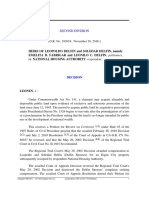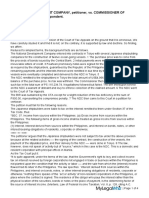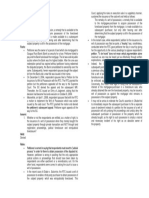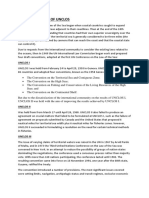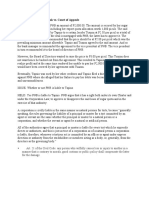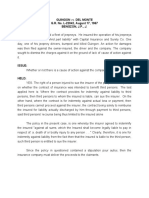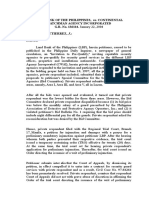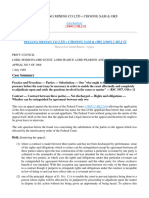0 ratings0% found this document useful (0 votes)
325 viewsCase Summary (BPI vs. de Coster)
Case Summary (BPI vs. de Coster)
Uploaded by
Alfredo BentulanDigest of SC Decision on BPI vs. De Coster, G.R. No. L-23181, March 16, 1925 (Following Rules on Plain English for Lawyers)
Copyright:
© All Rights Reserved
Available Formats
Download as DOCX, PDF, TXT or read online from Scribd
Case Summary (BPI vs. de Coster)
Case Summary (BPI vs. de Coster)
Uploaded by
Alfredo Bentulan0 ratings0% found this document useful (0 votes)
325 views3 pagesDigest of SC Decision on BPI vs. De Coster, G.R. No. L-23181, March 16, 1925 (Following Rules on Plain English for Lawyers)
Copyright
© © All Rights Reserved
Available Formats
DOCX, PDF, TXT or read online from Scribd
Share this document
Did you find this document useful?
Is this content inappropriate?
Digest of SC Decision on BPI vs. De Coster, G.R. No. L-23181, March 16, 1925 (Following Rules on Plain English for Lawyers)
Copyright:
© All Rights Reserved
Available Formats
Download as DOCX, PDF, TXT or read online from Scribd
Download as docx, pdf, or txt
0 ratings0% found this document useful (0 votes)
325 views3 pagesCase Summary (BPI vs. de Coster)
Case Summary (BPI vs. de Coster)
Uploaded by
Alfredo BentulanDigest of SC Decision on BPI vs. De Coster, G.R. No. L-23181, March 16, 1925 (Following Rules on Plain English for Lawyers)
Copyright:
© All Rights Reserved
Available Formats
Download as DOCX, PDF, TXT or read online from Scribd
Download as docx, pdf, or txt
You are on page 1of 3
BPI vs. GABRIELA ANDREA DE COSTER y ROXAS, et al. (G.R. No. L-23181.
March 16, 1925)
Summary:
Factual backdrop of the case:
Gabriela Andrea R. De Coster, with her husband, Jean M. Poizat, as her agent,
allegedly made a joint and several promissory note for P292,000 payable in 1 year in
favor of BPI. To secure its payment, De Coster, thru her husband, allegedly executed a real
estate mortgage on a property in Manila City likewise for BPI a property which was
subject of a prior mortgage in favor of the Dominican Order. In addition, a chattel mortgage
was also executed by Jean Poizat and J.M. Poizat & Co. on two steamships belonging to the
Poizat Vegetable Oil Mills.
The note remained unpaid after a year prompting BPI to file a complaint on March
10, 1924 with the Court of First Instance (CFI) of Manila City, wherein BPI was able to
secure a favourable judgment and was awarded P292,000, plus interest and other costs.
However, De Coster did not pay BPI. As a result, BPI asked the court to order the sheriff to
take immediate possession of the property described in the chattel and real estate
mortgages and sell the same to satisfy the amount due the bank. Meanwhile, on April 24,
1924, the Dominican Fathers intervened in the suit and prayed of the court to consider the
credit owed to them upon the foreclosure of the real estate mortgage.
The CFIs questioned decision:
On May 3, 1924, upon BPIs motion, spouses De Coster and Poizat, as well as J.M.
Poizat & Co., were all declared in default by the court for their failure to appear or file their
answer. Without notifying the defendants, and after introducing evidence, the court on June
24, 1924 granted both prayers by BPI and the Dominican Fathers.
Thereafter, on August 26, 1924, De Coster filed a motion praying that the questioned
judgment be set aside and the case be re-opened and tried on its merits. De Coster
contends that at the time the complaint was filed and summons was served on her
husband, she was absent from the Philippines and was residing in Paris, France from the
year 1908 to April 30, 1924 upon her return to the country, and therefore, the court did not
acquire jurisdiction over her. She further contends that she knows nothing of her
husbands dealings with BPI and that she only learned of the default judgment against her
on July 28, 1924 through the local newspapers.
Moreover, she contends that money owed to BPI was a personal loan of Jean Poizat
and J.M. Poizat & Co. and that she did not authorize her husband to sign her name on the
promissory note, thus, making her liable as a surety. And finally, she claims that the real
estate mortgage on her property executed by her husband for BPI was void as it was given
to secure a void obligation. The court, however, denied said motion. She then moved for
reconsideration, but the court denied this as well.
The Appeal:
She then filed an appeal with the Supreme Court and questioned the lower courts
jurisdiction over her as summons was served invalidly and the judgment of said court
making her and her property liable to BPI based on a void promissory note and void real
estate mortgage.
a.) On the question of jurisdiction:
In resolving the first issue, the Supreme Court ruled that there was indeed invalid
service of summons. First, the Court noted that the Sheriff served the summons on March
13, 1924, a time when De Coster was still out of the country. Also, summons was served on
that date at the house of Jean M. Poizat. Upon the admitted facts, the High Court held that
the husbands residence was not the wifes usual place of residence. Also, there is nothing
in the record showing that her husband accepted service of any process for his wife,
whether acting as her agent or as her representative.
De Costers first appearance in court was made when she filed the August 26, 1924
motion wherein she prayed that the default judgment be set aside and that the case be re-
opened and tried on the merits. When she filed said motion, she thus submitted herself to
the lower courts jurisdiction at that time only.
Now, even if the husband was authorized to institute, prosecute and defend all
actions or proceedings in a court of justice, including accepting notices and summons, the
fact that he failed and neglected to perform his duties as her agent will not bar De Coster, as
the principal, to obtain legal relief in this case. And here, such a relief was duly and
properly made.
b.) On the question of the void note:
Anent her contention that the promissory note was void, the High Court agreed with
her that under the power of attorney given by De Coster to her husband, he had no
authority to execute a joint and several note nor to make her liable as an accommodation
maker or surety, as the case may be. The money owed to BPI was Jean Poizat and his
companys alone, and she was not a party to such loan, and therefore, was not obligated to
pay it. The old, original debts of her husband and his company to the bank were all taken
up and merged in the new note in question.
Furthermore, the bank knew that not a dollar was loaned nor borrowed on the
strength of the note. It was actually given at the banks urgent and pressing demand to
obtain security for the previous indebtedness of Jean Poizat, and the record is bereft of
anything that would even hint at that De Coster was a party to the original notes.
Considering these facts, De Coster had a valid defense against the payment of the
questioned note, and thus, she is not liable to pay it or the original notes.
In addition, the note and mortgage show on their face that De Costers husband as
her attorney-in-fact executed them. The bank knew or should have known the nature and
extent of Jean Poizats authority and the limitations on his power. The fact is, there is no
provision in the husbands power of attorney that empowers or authorizes him to sign
anything or to do anything that will make his wife liable as a surety for a pre-existing debt.
c.) On the question of the void mortgage:
The same is true of the real estate mortgage. The note being void as to De Coster, it
follows that as to her, the real estate mortgage is also void for want of power to execute it.
Hence, the SC reversed the lower courts ruling and remanded the case to said court for
trial on the merits.
In a similar manner, respecting the Dominican Fathers claim, the SC likewise
reversed the lower courts judgment favouring them. The Court held that it cannot be
sustained as they did not serve a copy of their plea upon the defendants De Coster and
Poizat. Firstly, the plea filed on April 24, 1924 does not even ask for a judgment for the
foreclosure of its mortgage. Secondly, they served a copy of their plea on BPI only and no
copy of the plea was ever served upon either of the defendants, who were the real parties
in interest. And unless waived, a defendant has a legal right to service of processes, to his
day in court and to be heard in his defense.
You might also like
- Compliance-Show Cause OrderDocument4 pagesCompliance-Show Cause OrderAlfredo Bentulan100% (6)
- Sample Demand Letter For Accounting & PaymentDocument1 pageSample Demand Letter For Accounting & PaymentAlfredo Bentulan100% (2)
- Redacted Petition For Correction of SexDocument5 pagesRedacted Petition For Correction of SexAlfredo Bentulan100% (1)
- Case Digest - West Rand Central Gold Mining Co. v. The KingDocument1 pageCase Digest - West Rand Central Gold Mining Co. v. The KingdariusNo ratings yet
- Manifestation/ComplianceDocument4 pagesManifestation/ComplianceAlfredo Bentulan100% (9)
- Erlanger vs. Swedish East AsiaticDocument2 pagesErlanger vs. Swedish East AsiaticLance MorilloNo ratings yet
- TABLE-SPECIAL CIVIL ACTIONS - And-Special-RulesDocument42 pagesTABLE-SPECIAL CIVIL ACTIONS - And-Special-RulesErikha AranetaNo ratings yet
- Heirs of Delfin Vs NHADocument26 pagesHeirs of Delfin Vs NHAMaria Angelica DavidNo ratings yet
- 5 Union Motor Corp Vs CADocument16 pages5 Union Motor Corp Vs CAShivaNo ratings yet
- Zamboanga Barter Traders V PlagataDocument2 pagesZamboanga Barter Traders V PlagatalesleyastridNo ratings yet
- Chapter 1 The Nature of International Law What Is International Law?Document7 pagesChapter 1 The Nature of International Law What Is International Law?Ruby RoxasNo ratings yet
- CASES - DigestDocument11 pagesCASES - DigestChameNo ratings yet
- Grotjahn Vs Judge Isnani - SebastianDocument2 pagesGrotjahn Vs Judge Isnani - SebastianEnrryson SebastianNo ratings yet
- Adelfa v. CADocument2 pagesAdelfa v. CADennis CastroNo ratings yet
- 15 Domingo Vs GarlitosDocument1 page15 Domingo Vs GarlitosJorela TipanNo ratings yet
- Natalia Realty, Inc. vs. Department of Agrarian Reform 225 SCRA 278, August 12, 1993Document2 pagesNatalia Realty, Inc. vs. Department of Agrarian Reform 225 SCRA 278, August 12, 1993Susie SotoNo ratings yet
- Crimpro Rule 113 and 114Document4 pagesCrimpro Rule 113 and 114Jen MoloNo ratings yet
- Nego Case Digest (CHECKS)Document8 pagesNego Case Digest (CHECKS)jackNo ratings yet
- SIMON vs. CHR Case DigestDocument2 pagesSIMON vs. CHR Case DigestTrisha Paola TanganNo ratings yet
- UE Vs PEPANO DigestDocument1 pageUE Vs PEPANO DigestPaolo SueltoNo ratings yet
- Boac Vs CadapanDocument1 pageBoac Vs CadapanKyle AlmeroNo ratings yet
- Rules On Succession Digests 1Document8 pagesRules On Succession Digests 1Adam Oliver DensenNo ratings yet
- Saldana vs. Phil. GuarantyDocument1 pageSaldana vs. Phil. GuarantyKeilah ArguellesNo ratings yet
- Spouses Lim Vs Limg.r. No. 163209Document1 pageSpouses Lim Vs Limg.r. No. 163209Levi IsalosNo ratings yet
- Lord Day & Lord, Barrett Smith, Plaintiffs, V. The Socialist Republic of VietnamDocument15 pagesLord Day & Lord, Barrett Smith, Plaintiffs, V. The Socialist Republic of VietnamjNo ratings yet
- 5 Cases Assigned - Parties To Civil ActionDocument9 pages5 Cases Assigned - Parties To Civil ActionElixirLanganlanganNo ratings yet
- The Great Eastern Life Insurance Co Vs HSBC and PNB-final DigestDocument2 pagesThe Great Eastern Life Insurance Co Vs HSBC and PNB-final DigestNikolaDaikiBorgiaNo ratings yet
- CIR Vs ManningDocument1 pageCIR Vs ManningAnonymous hbUJnBNo ratings yet
- Maniago vs. Atty. de DiosDocument3 pagesManiago vs. Atty. de DiosSuzie100% (1)
- National Development Company (NDC) Vs Commissioner of Internal Revenue (CIR) 151 SCRA 472Document4 pagesNational Development Company (NDC) Vs Commissioner of Internal Revenue (CIR) 151 SCRA 472Mark Gabriel B. MarangaNo ratings yet
- Conflicts of Laws - ReviewerDocument14 pagesConflicts of Laws - ReviewerStephen AdrayanNo ratings yet
- Development Bank of The Philippines vs. Arcilla: Truth in Lending ActDocument4 pagesDevelopment Bank of The Philippines vs. Arcilla: Truth in Lending ActJosiebethAzueloNo ratings yet
- Special Power of Attorney: Know All Men by These PresentsDocument2 pagesSpecial Power of Attorney: Know All Men by These PresentsCorina MontillaNo ratings yet
- Ten Forty Realty Vs CruzDocument1 pageTen Forty Realty Vs CruzJed MacaibayNo ratings yet
- Javate v. Spouses Tiotuico G.R. No. 187606 March 9, 2015 DoctrineDocument1 pageJavate v. Spouses Tiotuico G.R. No. 187606 March 9, 2015 DoctrineMarion KhoNo ratings yet
- 979 Bismonte Vs Golden Sunset ResortDocument1 page979 Bismonte Vs Golden Sunset Resorterica pejiNo ratings yet
- The Background of UnclosDocument3 pagesThe Background of UnclosEka Ayu WulandariNo ratings yet
- CIR V DLSUDocument1 pageCIR V DLSUrgomez_940509No ratings yet
- Spouses Cayetano and Tiongson v. CADocument3 pagesSpouses Cayetano and Tiongson v. CAangelo prietoNo ratings yet
- Missouri Vs HollandDocument4 pagesMissouri Vs HollandsirenangblueNo ratings yet
- Sansio V MogolDocument2 pagesSansio V Mogolkpaglicawan_1No ratings yet
- Case Digest - RCCDocument21 pagesCase Digest - RCCSue BabaranNo ratings yet
- Case Digest - Week 5.2Document80 pagesCase Digest - Week 5.2Van John MagallanesNo ratings yet
- Leonen Concurring OpinionDocument11 pagesLeonen Concurring OpinionJojo MaligNo ratings yet
- BPI vs. Intermediate Appellate Court GR# L-66826, August 19, 1988Document3 pagesBPI vs. Intermediate Appellate Court GR# L-66826, August 19, 1988Jolet Paulo Dela CruzNo ratings yet
- Ingusan Vs Heirs of ReyesDocument11 pagesIngusan Vs Heirs of ReyesMark AnthonyNo ratings yet
- Interpleader CasesDocument19 pagesInterpleader CasesmonjekatreenaNo ratings yet
- GUINGON vs. DEL MONTEDocument1 pageGUINGON vs. DEL MONTEwuplawschoolNo ratings yet
- 51 Prudencio Vs CADocument8 pages51 Prudencio Vs CACharm Divina LascotaNo ratings yet
- CaseDocument5 pagesCaseRose Ann Veloria100% (1)
- Union Motor Corporation Vs CADocument7 pagesUnion Motor Corporation Vs CAJillian BatacNo ratings yet
- Landbank of The Philippines V Continental Watchmen and CADocument2 pagesLandbank of The Philippines V Continental Watchmen and CAElah ViktoriaNo ratings yet
- 16 - Villanueva vs. Domingo PDFDocument2 pages16 - Villanueva vs. Domingo PDFJm SantosNo ratings yet
- Sales - Finals (Digests)Document7 pagesSales - Finals (Digests)oniksukkieNo ratings yet
- Vda. de Chua V CADocument16 pagesVda. de Chua V CAOdette JumaoasNo ratings yet
- Santiago vs. PSLBDocument1 pageSantiago vs. PSLBFlor Ann CajayonNo ratings yet
- Gsis Vs CaDocument7 pagesGsis Vs CaLilu BalgosNo ratings yet
- SPS. Flores vs. SPS PinedaDocument2 pagesSPS. Flores vs. SPS PinedaAijeleth Shahar G AwacayNo ratings yet
- 379 - Vector Shipping v. American Home., 3 July 2013Document2 pages379 - Vector Shipping v. American Home., 3 July 2013Reynaldo Lepatan Jr.No ratings yet
- Internatiomal Law CasesDocument16 pagesInternatiomal Law CasesMary Kristin Joy GuirhemNo ratings yet
- Transfer Taxes: SEC. 84 Rates of Estate Tax. - There Shall Be Levied, AssessedDocument16 pagesTransfer Taxes: SEC. 84 Rates of Estate Tax. - There Shall Be Levied, AssessedAster Beane AranetaNo ratings yet
- 78 McArthur v. Times Printing CoDocument3 pages78 McArthur v. Times Printing CoStephen ParaisoNo ratings yet
- Salenga v. NLRC GR 174941 February 1, 2012Document1 pageSalenga v. NLRC GR 174941 February 1, 2012James WilliamNo ratings yet
- Facts: On February 4, 1977, Then President Ferdinand E. Marcos Issued PresidentialDocument7 pagesFacts: On February 4, 1977, Then President Ferdinand E. Marcos Issued PresidentialAbigail DeeNo ratings yet
- Standard Oil Co. of New York vs. Cho SiongDocument1 pageStandard Oil Co. of New York vs. Cho SiongShane Nuss RedNo ratings yet
- The Young Adult Starter Kit: 12 Steps To Being A Better Person: YA Self-HelpFrom EverandThe Young Adult Starter Kit: 12 Steps To Being A Better Person: YA Self-HelpNo ratings yet
- Motion To Reopen Bail HearingDocument8 pagesMotion To Reopen Bail HearingAlfredo BentulanNo ratings yet
- Notice of Dismissal of EmployeeDocument1 pageNotice of Dismissal of EmployeeAlfredo Bentulan0% (2)
- SPA Pre TrialDocument2 pagesSPA Pre TrialAlfredo Bentulan100% (9)
- Report On New Code of Judicial ConductDocument2 pagesReport On New Code of Judicial ConductAlfredo Bentulan50% (2)
- Mabanag V Lopez VitoDocument1 pageMabanag V Lopez VitoNikki Andrade100% (1)
- CAR RENTAL ProposalDocument5 pagesCAR RENTAL ProposalPnp Initao MpsNo ratings yet
- Corazon Lacap vs. Sandiganbayan, G.R. No. 198162, June 21, 2017 (Sec. 3 (F) RA 3019)Document9 pagesCorazon Lacap vs. Sandiganbayan, G.R. No. 198162, June 21, 2017 (Sec. 3 (F) RA 3019)JERRY JR DEGUITNo ratings yet
- School of Law and Governance: Submitted To:-Submitted ByDocument18 pagesSchool of Law and Governance: Submitted To:-Submitted Bysuruchi suman 125No ratings yet
- Commercial Bench: Presented By: Rukmani Khadka B523Document12 pagesCommercial Bench: Presented By: Rukmani Khadka B523Rukmani KhadkaNo ratings yet
- Principle of Unjust EnrichmentDocument3 pagesPrinciple of Unjust EnrichmentAanchal KashyapNo ratings yet
- Quote - 468345Document4 pagesQuote - 468345Tyga BankzNo ratings yet
- GRC NDNC PDFDocument2 pagesGRC NDNC PDFDarnell WoodardNo ratings yet
- SECTION 1.02.03 - Building PermitsDocument2 pagesSECTION 1.02.03 - Building PermitsArcon Solite BarbanidaNo ratings yet
- National Labor Relations Board v. A.P.W. Products Co., 316 F.2d 899, 2d Cir. (1963)Document9 pagesNational Labor Relations Board v. A.P.W. Products Co., 316 F.2d 899, 2d Cir. (1963)Scribd Government DocsNo ratings yet
- BOHEMIA BAY YACHT HARBOUR CONDOMINIUM ASSOCIATION, INC. v. ACE AMERICAN INSURANCE COMPANY ComplaintDocument10 pagesBOHEMIA BAY YACHT HARBOUR CONDOMINIUM ASSOCIATION, INC. v. ACE AMERICAN INSURANCE COMPANY ComplaintACELitigationWatchNo ratings yet
- Voice Your Opinion: Carmel Board of Zoning AppealsDocument2 pagesVoice Your Opinion: Carmel Board of Zoning AppealsOmer ErgeanNo ratings yet
- Tadeja Vs PeopleDocument4 pagesTadeja Vs PeopleLindsay MillsNo ratings yet
- CDI 1 TOPIC 6 Key Principle in CIDocument3 pagesCDI 1 TOPIC 6 Key Principle in CIprincessmayrossnavarroNo ratings yet
- Republic v. Evangelista, 466 Scra 544 (2005)Document2 pagesRepublic v. Evangelista, 466 Scra 544 (2005)Roi Angeli V. DomingoNo ratings yet
- Final Exam-Torts and Damages 2018 PDFDocument2 pagesFinal Exam-Torts and Damages 2018 PDFcharmagne cuevasNo ratings yet
- Wrong Mode of AppealDocument2 pagesWrong Mode of AppealKarl Michael KoaNo ratings yet
- Morillo vs. PeopleDocument13 pagesMorillo vs. PeopleAnakataNo ratings yet
- Freeman Dockery v. Jack Cowley, 66 F.3d 338, 10th Cir. (1995)Document2 pagesFreeman Dockery v. Jack Cowley, 66 F.3d 338, 10th Cir. (1995)Scribd Government DocsNo ratings yet
- Family CodeDocument9 pagesFamily Codejoel ayonNo ratings yet
- The United States Vs Silvestre Pompeya Case DigestDocument2 pagesThe United States Vs Silvestre Pompeya Case DigestCharmaine Mejia100% (4)
- Dela Cruz v. Court of Appeals, G.R. No. 139442 (December 6, 2006) Case DigestDocument1 pageDela Cruz v. Court of Appeals, G.R. No. 139442 (December 6, 2006) Case Digestapple_doctoleroNo ratings yet
- Distribution of Powers Between Union and StateDocument20 pagesDistribution of Powers Between Union and StateKartik SainiNo ratings yet
- PEGANG MINING CO LTD V CHOONG SAM & ORS, (1969) 2 MLJ 52Document7 pagesPEGANG MINING CO LTD V CHOONG SAM & ORS, (1969) 2 MLJ 52Matthew Van HuizenNo ratings yet
- 18-Sehwani, Inc. vs. In-N-Out Burger, Inc. G.R. No. 171053 October 15, 2007Document7 pages18-Sehwani, Inc. vs. In-N-Out Burger, Inc. G.R. No. 171053 October 15, 2007Jopan SJNo ratings yet
- Castro vs. CastroDocument1 pageCastro vs. CastroBJMP REGION - X OZAMIZ CITY JAIL FDNo ratings yet
- Manila Trading - Supply Co vs. Saez, 66 Phil. 237Document2 pagesManila Trading - Supply Co vs. Saez, 66 Phil. 237Gilda P. OstolNo ratings yet
- 1.metropolitan Bank & Trust Company vs. TondaDocument4 pages1.metropolitan Bank & Trust Company vs. Tondajolly verbatimNo ratings yet







